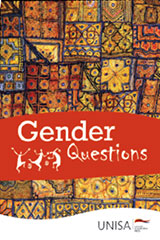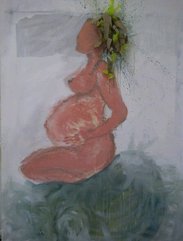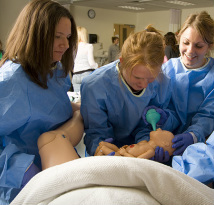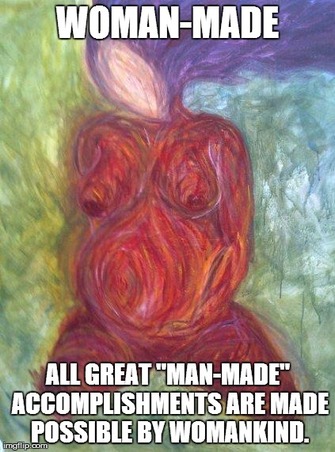
"Birthing New Life and Discovering New Strength" in Beyond Burning Bras: Feminist Activism for Everyone (ABC-CLIO, 2010) (Available here)

(Forthcoming) “Patriarchal Policing of Gender Norms in TV and Filmic Representations of Childbirth,” Gender Questions.
|
 Fluid Womyn, by Grimsditch, Haigh Fluid Womyn, by Grimsditch, Haigh
"Mother Beware: Perilous Scholarly and News Media Discourse around Homebirth," The International Journal of Communication and Health.” Fall 2013, Vol 1, no 2.

“High-Fidelity Birth Simulators in American Culture: An Ecofeminist Analysis,” The Journal of American Culture: “The Greening – or not – of America.” March 2012.
|
Woman-Made Lecture Series
based on Feminism and the Mastery of Women and Childbirth
|
1) Feminism and the Philosophy of Childbirth, an Examination of Theoretical Origins Philosophical Origins of Medicalized Childbirth
In this lecture Dr. Nall provides a historical exploration of the conceptual tenets that influenced the rise of medicalization of childbirth. Nall deconstructs the dominant understanding of childbirth as a medical procedure that holds sway over a great majority of not only uninformed citizens, but also medical professionals. The understanding of childbirth as a form of pathology, he argues, can be understood as a product of a patriarchal conceptual framework that links female biology to “disability” and to “nature” as opposed to “culture.” This is indicated in a variety of scholarly literature discussing the historical rise of medicalized birth between the 18th and 19th centuries, and through his examination of original, 20th century medical documents. This work does not challenge the uncontroversial contention that medical intervention can and has been useful in saving the lives of both birthing mothers and their newborn children. What is at issue is the presumption that childbirth, on average and in general, requires medical interventions generally reserved for life-threatening situations. 2) (High-Fidelity) Birth Simulators and the Erosion of Maternal Agency
In this work Dr. Nall offers a feminist critique of medicalized understanding and practices surrounding childbirth. He particularly addresses the use of newly developed “high fidelity,” mannequin birth simulators. These simulators are being promoted in the United States as valuable teaching tools for educating healthcare workers such as nurses about the birth process. Nall contends that these mannequins simulate an oppressive, disempowering medical conceptualization of women’s biology which perpetuates the long standing patriarchal understanding of the womb as a source of pathology. Such simulations have the effect of educating practitioners not in birth in of itself, but in a disempowering vision of women and birth. He further contends that birth simulators and, more generally, the medical birth model itself implement what the ecofeminist philosopher Val Plumwood calls the “logic of dualism,” which has the effect of portraying birthing women’s consciousness and agency as impediments to successful birth. 3) Homebirth Scares – How Our Understanding of Hospital birth and Homebirth are Misguided
In this talk Dr. Nall discusses medical scholarship and news media proclamations of the dangers of homebirth. Nall contends that such has had the effect of strengthening the popular belief that women’s reproductive processes are inherently prone to malfunction and, thus, require technological intervention in order to ensure “safe” births. Yet the foundation, upon which such claims rest, specifically, a widely touted 2010 study indicating the risk homebirth poses to infant mortality, is marred by fallacies that seem due to negative gendered presumptions about female biology. |
4) And the Congratulations Go to…Someone Else: Pregnant Damsels in Distress and Childbirth in the Movies
In this talk Dr. Nall takes students on a tour through the representation of childbirth in contemporary Hollywood films and popular television. He argues that dominant cultural representations foster a narrow and potentially damaging, disempowering, and dehumanizing depiction of childbirth. In particular the representation of childbirth almost always falls within these narrow themes: birth is a bitter experience, birth is a medical event, birth has very little to do with maternal agency, birth is not an accomplishment, and the reproductive double-bind: the idea that women are both purposed to birth children but that they are also not sufficiently equipped to do so without the significant assistance of men. 5) Mothers Talk Back: Revolutionary Representations of Female-led Childbirth
In this talk Dr. Nall turns to a tapestry of popular, though largely marginalized, culture to articulate the way in which counter-hegemonic portrayals of birth stand in stark contrast to those previously discussed. He argues that mother-centered and midwifery-informed conceptualizations of birth represented in individual women’s birth experiences, popular essays, and films such as Business of Being Born (BoBB) (2007) and Birth as We Know It (2006), resist and in fact undermine the dominant patriarchal conceptualization of childbirth by confusing and transgressing gender stereotypes and polarities. Indeed, he contends that such representations of mother-centered birth not only serve to de-objectify women, whose typical representation is that of sex-object, but also foster critical reflection on masculinity by male participants. In particular, alternative conceptions of childbirth such as these allow men to exchange the often burdensome and impossible “man-in-control” role, expressed in the notion of male partner as “coach,” for the role of nurturing “man-in-awe.” |
